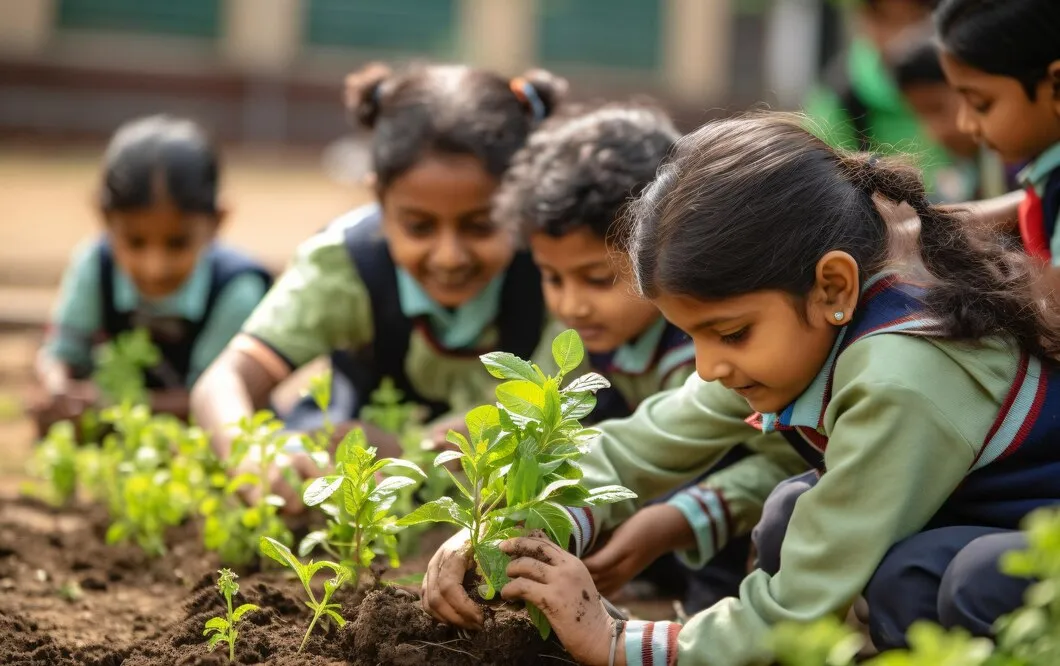
Gardening with Kids: Teaching Sustainability and Responsibility
Introduction
Gardening with kids offers more than just the joy of watching plants grow; it’s a valuable opportunity to teach important life skills and practical knowledge. When children get their hands dirty in the garden, they’re not only learning about nature and the science behind plant growth but also discovering essential lessons about responsibility, sustainability, and creativity. This hands-on activity transforms abstract concepts into tangible experiences, making learning both engaging and effective.
Benefits of gardening with kids
1. Physical Activity
Gardening with kids promotes physical activity by turning tasks like digging, planting, and weeding into exercise. It encourages outdoor play, enhances fine motor skills, and builds endurance, making physical activity fun and engaging.
2. Responsibility and Patience
Gardening with kids teaches responsibility and patience by involving them in regular tasks such as watering, weeding, and harvesting. Caring for plants requires consistent attention and effort, helping children learn the value of routine and long-term commitment. Watching plants grow slowly over time fosters patience and a sense of accomplishment, as they see the results of their care and perseverance.
3. Educational Development
Gardening with kids enhances educational development by providing practical lessons in plant biology and environmental science. Through activities like tracking plant growth and exploring soil types, children gain a deeper understanding of scientific concepts. Gardening also improves problem-solving skills as kids address challenges such as pests and weather conditions, making learning interactive and relevant.
4. Encourages Healthy Eating
Gardening encourages healthy eating by exposing kids to fresh, homegrown fruits and vegetables, which often makes them more willing to try and enjoy these nutritious foods. It helps children understand where their food comes from and the effort involved in growing the plants, creating a sense of appreciation for healthy eating habits.
5. Self-Confidence
Gardening boosts self-confidence in kids by giving them a sense of achievement through successfully growing plants. As they see their efforts result in healthy vegetables or blooming flowers, they gain pride in their accomplishments. This hands-on success builds their self-esteem and encourages them to tackle new challenges with confidence.


Teaching Sustainability and Responsibility
Teaching sustainability through gardening helps to build eco-friendly habits in children. Here's how:
1. Composting
Composting teaches kids how to recycle organic materials like kitchen leftovers and garden waste into valuable soil. This process shows them how waste can be repurposed to improve soil health, highlighting the importance of reducing waste and practicing environmental sustainability and responsibility.
2. Water Conservation
Water conservation in gardening teaches kids to use water efficiently through methods like drip irrigation and rain barrels, highlighting the importance of saving water and its environmental impact.
3. Organic Gardening
Organic gardening teaches kids to grow plants without synthetic chemicals, using natural methods instead. This approach shows them how to promote healthy soil and ecosystems, fostering an understanding of environmentally friendly practices.
4. Reducing Plastic Use
Reducing plastic use in gardening teaches kids the importance of minimizing waste and opting for sustainable alternatives. By using items like biodegradable pots and recycled materials for garden markers, children learn to make eco-friendly choices that lessen environmental impact.
Creative Gardening Activities for Kids
1. Watering plants
2. Pulling wild plants
3. Cleaning the garden
4. Composting the soil
5. Building a bird feeder
6. Harvesting home-grown fruits and vegetables
Garden Safety Tips for Kids
1. Always store sprays and fertilizers out of children’s reach. Use child-friendly and non-toxic gardening products.
2. Ensure fences and gates are properly secured to prevent accidental access and ensure a safe garden environment.
3. Equip kids with sunscreen, hats, protective clothing, and gumboots to shield them from the sun and garden hazards.
4. Store garden tools and equipment out of reach when not in use.
5. Educate kids about which plants are safe to touch and which might be harmful.
Conclusion
Gardening with kids is more than just a fun outdoor activity. It helps them learn important skills like responsibility and patience. It teaches them about nature, healthy eating, and taking care of the environment. Activities like composting, saving water, and organic gardening show kids how their actions can make a difference. Gardening not only helps plants grow but also helps children feel proud of their efforts and stay connected to nature for life.


